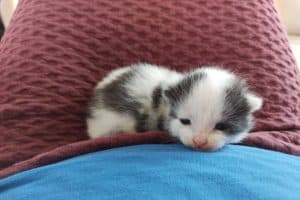Cats attacking newborns can be a concerning and puzzling behavior for many pet owners. Understanding why this happens is crucial in keeping both your feline friend and your new addition safe. In this blog post, we will explore the reasons behind why cats may exhibit aggression towards newborn babies and provide helpful tips on how to prevent and address this issue.
The Instinctual Nature of Cats
Cats are adorable creatures with a complex set of instincts that sometimes lead them to act in ways that may seem confusing to us humans. One key instinct that can trigger a cat to attack a newborn is their prey drive. Cats are natural hunters, and they may see a tiny, vulnerable infant as potential prey due to their small size and movements.
Another instinct at play is a cat’s territorial behavior. Cats are known to be fiercely protective of their space and may feel threatened by the presence of a new family member, especially one that produces unfamiliar sounds and scents that disrupt their sense of security.
It’s important to understand that these behaviors are rooted deep in a cat’s nature, and while they may be challenging to manage, they can be addressed with patience, training, and proper introductions to the newborn. Remember, your cat isn’t attacking out of malice but rather out of their instinctual responses to perceived threats.
Lack of Familiarity and Acclimation
Imagine coming home one day to find a stranger has moved into your house. You might feel uneasy, on edge, and defensive. Well, that’s how your cat might feel when faced with a newborn they have not been properly introduced to. Cats rely heavily on their sense of smell, and any new scent can trigger fear and confusion in them.
To prevent your feline friend from seeing the newborn as a threat, it’s crucial to acclimate them slowly and gently. Introduce the baby’s scent by bringing home items with their smell before the baby arrives, allowing your cat to get used to it gradually. Spend quality time with your cat in the same room as the newborn, offering treats and positive reinforcement to create a positive association.
By taking the time to familiarize your cat with the new addition to the family, you can help prevent aggressive behaviors and foster a harmonious environment for everyone in the household.
Additional Unique Insight: Cats are creatures of habit, and sudden changes can be stressful for them. Keeping their routine consistent during the transition period can help alleviate anxiety and reduce the likelihood of them acting out towards the newborn.
Stress and Anxiety Triggers
Cats may attack newborns due to stress and anxiety triggers that disrupt their sense of security and routine. Changes in routine can lead to cats feeling unsettled, causing them to act out aggressively towards infants. Loud noises, such as a crying baby or household commotion, can escalate a cat’s stress levels, triggering defensive behaviors. Additionally, lack of attention from their human caregivers can make cats feel neglected, leading to increased anxiety and potential aggression towards vulnerable newborns.
Past Trauma and Negative Associations
A cat’s past experiences play a significant role in their behavior towards infants. Past trauma or negative interactions with children can create lasting negative associations that influence how a cat perceives and reacts to newborns. Lack of socialization during kittenhood can also contribute to aggressive behavior towards infants, as cats may not have learned appropriate ways to interact with young children in a positive manner. It’s crucial to understand and address these past experiences to prevent future attacks on newborns.
Unique Insight : Providing a safe and enriching environment for your cat, filled with toys, scratching posts, and hiding spots, can help alleviate stress and reduce the likelihood of aggressive behaviors towards newborns. By ensuring your cat has outlets for play and relaxation, you can promote positive interactions with infants and create a harmonious household environment.
Remember, understanding the reasons behind your cat’s behavior is the first step towards addressing and preventing attacks on newborns. By addressing stress triggers, past trauma, and negative associations, you can help create a safe and happy environment for both your cat and your infant.
Behavioral Strategies and Counterconditioning
If your cat is showing aggression towards your newborn, it’s essential to implement behavioral strategies to help them adjust. Positive reinforcement training is key – reward your cat for calm behavior around the baby. Environmental enrichment, such as providing scratching posts and interactive toys, can also distract your cat. Creating safe spaces, like high perches or cozy hiding spots, gives your cat a retreat when feeling overwhelmed. Remember, patience is key as it may take time for your cat to accept the new family member.
Seeking Professional Help
If your cat’s aggressive behavior towards your newborn persists, don’t hesitate to seek professional help. Consulting with a veterinarian or animal behaviorist can provide tailored interventions for your specific situation. They can offer expert advice on managing your cat’s aggression and creating a harmonious environment for both your pet and your newborn. Remember, professional help is always available to support you and your furry friend during this transition.
Additional Insight:
– It’s crucial to address any underlying medical issues that could be causing your cat’s aggression towards the newborn. A vet can rule out any health concerns that may be contributing to the behavior.
Remember, with patience, perseverance, and the right guidance, you can help your cat adjust to the presence of a newborn in your home.
Creating a Safe Environment for Both
It’s crucial to establish boundaries and create a harmonious space where your cat and newborn can coexist peacefully. Supervision is key – always monitor interactions between your cat and baby to ensure safety. Provide separate spaces for both, where your cat can retreat to when needed. Positive reinforcement is essential – reward your cat for calm behavior around the baby. Consistent routines help cats feel secure, reducing the likelihood of aggressive behavior. By setting clear boundaries, offering supervision, and creating a safe environment, you can promote a peaceful coexistence between your cat and newborn.
Fun Fact: Cats and Babies Throughout History Throughout history, cats and babies have shared a unique relationship in folklore, art, and culture. In many cultures, cats were believed to ward off evil spirits and protect infants. Ancient Egyptians revered cats as symbols of protection and fertility, often depicted in art with children. Medieval Europe saw cats as guardians of newborns, believed to keep away malevolent forces. Japanese folklore includes stories of lucky cats bringing prosperity and happiness to households with babies. This longstanding connection between cats and babies in history sheds light on the special bond these two entities share.
By understanding the reasons behind why cats may attack newborns and implementing effective strategies to foster a safe environment, you can ensure a harmonious and secure living space for all members of your family. Remember, with proper boundaries, supervision, and a respectful environment, your cat and newborn can coexist peacefully and happily.
Alex, a passionate animal lover, has experience in training and understanding animal behavior. As a proud pet parent to two dogs and three cats, he founded AnimalReport.net to share insights from animal experts and expand his knowledge of the animal kingdom.









